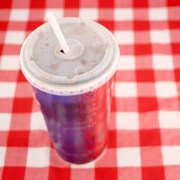 Hemera/Thinkstock
Hemera/Thinkstock
When New York City Mayor Michael Bloomberg proposed to ban the sale of sugary drinks in excess of 16-ounces in May, 2012, it raised more than a few eyebrows.
Although the ban isn’t to take place until March 2013 and affects only restaurants, movie theaters, sporting arenas and street carts, critics claim the move limits their freedom of choice.
Bloomberg, who banned sugary drinks in schools in 2003, scoffs at the notion that the ban is limiting individual freedom.
The move, he said, is to help curb obesity and chronic illness in America’s largest city. By limiting portion size, the city hopes consumers will pick healthier choices.
But not everyone is sweet on that idea. On July 9, 2012, about 50 anti-ban protestors chanted, “Drink free or die” in the City Hall Park as part of the Million Big Gulp March.
Protest organizer, NYC Liberty HQ spokesman Zach Huff said the march is “about more than just the size of drinks.”
”It’s is our long-overdue response to a governing ideology that thinks it can tell us what fat we can cook with, how much popcorn we can buy, whether we can use table salt or even how much water we can bathe with and use in each flush,” he said in a statement.
“It’s astonishing to see a pro-choice mayor be so anti-choice when it comes to trivial personal decisions.”
But when it comes to sugary drinks, it’s not just the Big Apple who’s soured on them. From Boston to California, hospitals, public health departments and city governments are saying no.
Some are proposing taxing sugary drinks while others are instituting bans similar to New York City's.
Ban proponents say sugar-sweetened beverages contribute to an increase in caloric intake without providing any nutrients. As America’s collective waistline gets larger, so does the incidence of chronic illnesses like cancer, diabetes and heart disease.
Research shows Americans consume 200 to 300 more calories a day now than they did 30 years ago, largely due to sugary drinks that contain high fructose corn syrup (HFCS).
“Sugar-sweetened beverages are impacting the health of Americans,” according to American Cancer Society Cancer Action Network (ACSCAN), the nonprofit, nonpartisan advocacy affiliate of the American Cancer Society.
ACSCAN sent a letter to U.S. Department of Health and Human Services Secretary Kathleen Sebelius last week requesting a Surgeon General report that examines just how the consumption of sugar-sweetened beverages impacts the health of Americans.
In the letter to Sebelius, ACSCAN President Christopher W. Hansen said “We know there is a direct link between excessive consumption of sugar-sweetened beverages and obesity, and the adverse health effect can be profound in children as they grow into adults and throughout their lives.
“Evidence suggests that obese children are more likely than normal-weight children to become obese adults, and that their obesity in adulthood is likely to be more severe.”
Opponents such as the American Beverage Association say that taxing soft drinks as some cities are proposing, or banning them from the public, wouldn't have much impact on public health.
The Corn Refiners Association, the national trade and lobbying group behind the “corn sugar” campaign say there is no difference between sugar types.
In 2010, research on
sugar addiction in rats by renowned Princeton psychologist Bart Hoebel showed the vast differences between HFCS and table sugar.
The study was new evidence as to how rats that digested HFCS not only became addicted to it, they also gained a significant amount of weight, mainly belly fat, compared to the rats that were fed table sugar.
In the HFCS rats, the researchers found that type of sugar increased circulating blood fats, called triglycerides.
In rats and humans, triglycerides are a mechanism for storing unused calories. In the human body, high levels of triglycerides in the bloodstream have been linked to atherosclerosis and, by extension, the risk of heart disease and stroke.
While there seems to be a consensus about the [obesity] problem and the cause, ACSCAN says what's missing from the public discussion is an articulate, science-based and comprehensive national plan of action.
“As was the case in 1964, when the Surgeon General first revealed to the broad American public the dangers of tobacco consumption, an unbiased and comprehensive report on the impact of sugar-sweetened beverages could have a major impact on the public’s consciousness and perhaps begin to change the direction of public behavior in their choices of food and drinks," the letter to Sebelius said.
"We believe the combined resources and credibility of the Surgeon General could help us get there.”
Lynette Summerill is an award-winning writer and Scuba enthusiast living in San Diego, CA with her husband and two beach loving dogs. In addition to writing about cancer-related issues for EmpowHER, her work has been seen in newspapers and magazines around the world.
Sources:
‘Million Big Gulp March’ Takes Aim At Bloomberg’s Proposed Big Drink Ban. CBS News New York. 9 July, 2012. Glenn Schuck. Accessed online:< cite>
http://newyork.cbslocal.com/2012/07/09/million-big-gulp-march-takes-aim-at-bloombergs-proposed-big-drink-ban
Kushi LH, Doyle C, McCullough M, et al. American Cancer Society Guidelines on Nutrition and Physical Activity for Cancer Prevention: Reducing the Risk of Cancer with Healthy Food Choices and Physical Activity. CA Cancer J Clin 2012; 62: 30-67.
http://www.cancer.org/acs/groups/cid/documents/webcontent/002577-pdf.pdf
ACS CAN Requests Surgeon General’s Report on Sugar-Sweetened Beverages. 3 July 2012. Accessed online. http://www.acscan.org/content/media-center/acs-can-requests-surgeon-generals-report-on-sugar-sweetened-beverages
Many are no longer sweet on soft drinks. Chicago Tribune. Jennifer Delgado. 9 July 2012. Reprinted Morris Daily Herald. Accessed at:
http://www.morrisdailyherald.com/2012/07/09/many-are-no-longer-sweet-on-soft-drinks/apx5lrq
Renowned psychologist Bart Hoebel - who studied addiction, behavior - dies
News at Princeton. Accessed July 9, 2012.
http://www.princeton.edu/main/news/archive/S30/80/58G73/
Reviewed July 10, 2012
by Michele Blacksberg RN
Edited by Jody Smith





Add a CommentComments
There are no comments yet. Be the first one and get the conversation started!